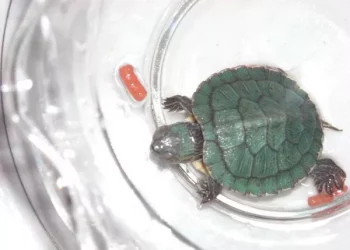Corn snakes, scientifically known as Pantherophis guttatus, are among the most popular pet snakes due to their docile nature and striking appearance. As a senior small animal researcher, I am frequently asked about the behavior and personalities of these fascinating reptiles. Do corn snakes, like mammals and birds, exhibit unique personalities? To explore this question, we will delve into the breed characteristics, living habits, and behavioral traits of corn snakes, providing a comprehensive understanding of whether they possess individual personalities.
Introduction to Corn Snakes
Breed Characteristics
Corn snakes are a species of rat snake native to the southeastern United States. They are known for their vibrant colors and patterns, which often include a mix of red, orange, and brown hues. Corn snakes can grow up to 5 to 6 feet in length, with females generally being larger than males. Their distinctive pattern includes a series of large, alternating black-edged red or orange blotches along their backs.
Corn snakes are named for the corn-like appearance of their scales, which have a distinctive pattern that resembles maize. They are non-venomous constrictors, meaning they subdue their prey by wrapping around it and squeezing until it suffocates. This method of hunting is typical among many snake species and is a crucial aspect of their survival strategy in the wild.
Living Habits
In their natural habitat, corn snakes are primarily terrestrial and are often found in wooded areas, grasslands, and agricultural fields. They are excellent climbers and are known to seek refuge in trees and shrubs. Corn snakes are solitary animals and are generally active during the warmer months. They spend much of their time searching for prey, which includes small rodents, birds, and lizards.
Corn snakes are also known for their adaptability and can thrive in a variety of environments. This adaptability makes them suitable for life in captivity, where they are often kept as pets. In captivity, corn snakes require a well-maintained habitat that includes a temperature gradient, appropriate humidity levels, and a hiding place to mimic their natural environment.
Understanding Personality in Animals
What Is Personality?
Personality, in the context of animal behavior, refers to consistent and distinctive patterns of behavior that are characteristic of an individual. These patterns can include variations in temperament, activity levels, and reactions to stimuli. For example, some animals may be more curious or bold, while others may be more reserved or cautious.
In scientific terms, personality is often studied through behavioral traits that remain stable over time and across different situations. Researchers use various methods to assess personality, including observation of behavior in different contexts and experimental assessments.
Personality in Reptiles
Reptiles, including snakes, have traditionally been considered to have less complex behavioral patterns compared to mammals and birds. However, recent research has challenged this view, suggesting that reptiles, including corn snakes, may exhibit individual differences in behavior that could be interpreted as personality traits.
Studies have shown that some reptiles display consistent differences in behavior, such as boldness, exploration, and aggression. For example, some individuals may be more exploratory or aggressive, while others may be more passive. These variations suggest that reptiles, including corn snakes, may have personality traits that influence their behavior.
Corn Snake Behavior: Evidence of Personality?
Observations of Individual Behavior
Corn snakes, like other reptiles, exhibit a range of behaviors that can vary from one individual to another. Some corn snakes may be more active and curious, while others may be more passive and reserved. These behavioral differences can be observed in various contexts, such as during feeding, handling, and exploration of their environment.
Feeding Behavior: Some corn snakes are aggressive feeders, striking quickly and consuming their prey with enthusiasm. Others may be more cautious, taking their time to assess their food before striking. This variation in feeding behavior can be seen as an indicator of individual differences in temperament.
Handling Response: Corn snakes also exhibit different responses to handling. Some individuals may be calm and tolerate being handled without issue, while others may be more defensive or attempt to escape. These responses can be influenced by factors such as early socialization, previous experiences, and individual temperament.
Exploration and Activity: The level of exploration and activity can vary among corn snakes. Some individuals are more adventurous and explore their enclosure thoroughly, while others may remain in their hiding spots and exhibit less curiosity. This variation in exploration behavior can be seen as a potential indicator of personality.
Factors Influencing Behavior
Several factors can influence the behavior of corn snakes, including their environment, socialization, and health. Understanding these factors can help explain the observed variations in behavior and provide insights into the potential presence of personality traits.
Environment: The environment in which a corn snake is housed can impact its behavior. A well-maintained enclosure with appropriate temperature, humidity, and hiding spots can encourage natural behaviors and reduce stress. Conversely, an inadequate environment can lead to stress and altered behavior.
Socialization: Corn snakes that are handled regularly from a young age may exhibit different behaviors compared to those that have limited human interaction. Early socialization can lead to a more tolerant and calm snake, while lack of socialization may result in a more defensive or fearful individual.
Health: Health issues can also affect behavior. Corn snakes experiencing health problems may exhibit changes in behavior, such as decreased activity or altered feeding habits. Ensuring that a corn snake is healthy and receiving appropriate care is essential for maintaining its overall well-being and behavior.
Research on Reptile Personality
Studies on Reptile Behavior
Recent research on reptile behavior has provided valuable insights into the potential presence of personality traits in reptiles. Studies have focused on various species, including lizards, turtles, and snakes, to explore individual differences in behavior.
See Also: Are Corn Snakes Aggressive?
Lizard Studies: Research on lizards has shown evidence of consistent individual differences in behavior, such as boldness and exploration. For example, some lizards are more aggressive or exploratory, while others are more cautious. These findings suggest that personality traits may be present in lizards and potentially in other reptiles, including corn snakes.
Turtle Studies: Studies on turtles have also provided evidence of individual differences in behavior. Research has shown that some turtles are more active and exploratory, while others are more sedentary. These variations in behavior may indicate the presence of personality traits in turtles.
Snake Studies: Research specifically on snakes is limited but growing. Studies have explored behavioral differences in various snake species, including corn snakes. These studies have provided evidence of consistent individual differences in behavior, suggesting that personality traits may be present in snakes.
Evidence from Corn Snake Research
Research on corn snakes has provided some evidence of individual differences in behavior that could be interpreted as personality traits. Observational studies have shown variations in feeding behavior, handling responses, and exploration among individual corn snakes. These findings suggest that corn snakes may exhibit personality traits similar to those observed in other reptiles.
Feeding Studies: Observational studies of corn snake feeding behavior have shown variations in aggression and enthusiasm. Some corn snakes are more aggressive feeders, while others are more cautious. These differences may reflect individual temperament and personality.
Handling Studies: Research on handling responses has shown variations in tolerance and defensiveness among corn snakes. Some individuals are more tolerant of handling, while others may be more defensive or attempt to escape. These differences may indicate the presence of personality traits.
Exploration Studies: Studies on exploration behavior have shown variations in activity levels and curiosity among corn snakes. Some individuals are more exploratory, while others remain more passive. These differences may reflect individual differences in personality.
Implications of Personality in Corn Snakes
Enrichment and Care
Understanding that corn snakes may have individual personalities has implications for their care and enrichment. Providing a stimulating and appropriate environment can enhance the well-being of corn snakes and encourage natural behaviors. Tailoring enrichment activities to the individual needs and preferences of each corn snake can improve their quality of life.
Enrichment Activities: Enrichment activities, such as providing hiding spots, climbing structures, and varied food items, can encourage natural behaviors and prevent boredom. Understanding the individual preferences of each corn snake can help in designing effective enrichment activities.
Handling and Interaction: Tailoring handling and interaction based on individual preferences and temperament can improve the relationship between the snake and its owner. Being aware of a corn snake’s comfort level with handling and providing appropriate socialization can enhance the overall experience for both the snake and its owner.
Research and Education
Research on reptile personalities, including corn snakes, contributes to our understanding of animal behavior and welfare. Educating pet owners and researchers about the potential presence of personality traits in reptiles can promote better care practices and increase awareness of the complexity of reptile behavior.
Educational Programs: Educational programs and resources that highlight the individual differences in reptile behavior can help pet owners and researchers appreciate the diversity and complexity of reptile personalities. Providing accurate and up-to-date information can improve the care and management of pet reptiles.
Future Research: Continued research on reptile personalities can provide further insights into the behavior and welfare of reptiles. Exploring individual differences in behavior and personality can contribute to our understanding of reptile cognition and improve their care and management.
Conclusion
In conclusion, corn snakes, like many other reptiles, may exhibit individual differences in behavior that could be interpreted as personality traits. Observational studies and research on reptile behavior suggest that corn snakes may have unique personalities, influenced by factors such as environment, socialization, and health.
Understanding that corn snakes may have personalities has implications for their care and enrichment, as well as for our broader understanding of reptile behavior. By recognizing and appreciating the individual differences in corn snake behavior, we can enhance their well-being and provide a better quality of life for these fascinating reptiles.
As research on reptile personalities continues to evolve, we gain a deeper appreciation for the complexity and diversity of reptile behavior. Whether you are a pet owner, researcher, or simply an enthusiast, acknowledging the potential presence of personality traits in corn snakes enriches our understanding of these remarkable creatures and enhances our connection with them.
Related Topics:

























